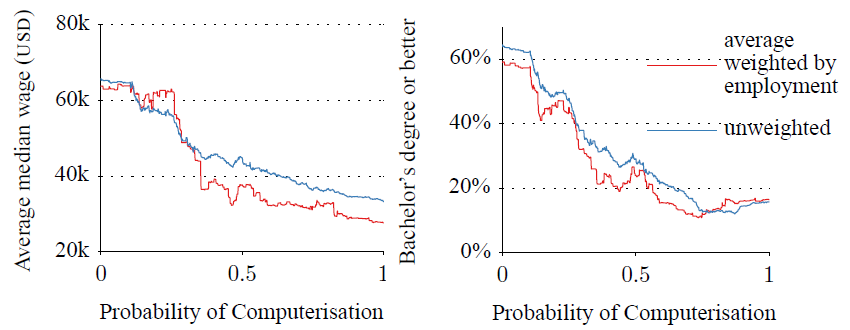Nearly half of U.S. jobs could be susceptible to computerization over the next two decades, a study from the Oxford Martin Programme on the Impacts of Future Technology suggests.
The study, a collaboration between Dr. Carl Benedikt Frey (Oxford Martin School) and Dr. Michael A. Osborne (Department of Engineering Science, University of Oxford), found that jobs in transportation, logistics, and office/administrative support are at “high risk” of automation.
More surprisingly, occupations within the service industry are also highly susceptible, despite recent job growth in this sector, they say.
“We identified several key bottlenecks currently preventing occupations being automated,” says Osborne. “As big data helps to overcome these obstacles, a great number of jobs will be put at risk.”
The study examined more than 700 detailed occupation types, noting the types of tasks workers perform and the skills required. By weighting these factors, as well as the engineering obstacles currently preventing computerization, the researchers assessed the degree to which these occupations may be automated in the coming decades.
The probability of computerization for the occupation types ranges from recreational therapists (the lowest ) to (thankfully) telemarketers, the highest probability (see report Appendix for the full list).

A move to ‘creative and social intelligence’ tasks
“Our findings imply that as technology races ahead, low-skilled workers will move to tasks that are not susceptible to computerization, i.e., tasks that require creative and social intelligence,” the paper states.
For example, while high-risk sales occupations (cashiers, counter and rental clerks, and telemarketers) interactive tasks, they do not necessarily require a high degree of social intelligence.
“For workers to win the race, however, they will have to acquire creative and social skills.”
Low-risk occupations
On the other hand, generalist occupations requiring knowledge of human heuristics, and specialist occupations
involving the development of novel ideas and artifacts, are the least susceptible to computerization, the findings show.
“Most management, business, and finance occupations, which are intensive in generalist tasks requiring social intelligence, are largely confined to the low-risk category. The same is true of most occupations in education, healthcare, as well as arts and media jobs. …
“The low susceptibility of engineering and science occupations to computerization, on the other hand, is largely due to the high degree of creative intelligence they require … although it is possible that computers will fully substitute for workers in these occupations over the long-run.”
Frey said the United Kingdom is expected to face a similar challenge to the U.S. “While our analysis was based on detailed datasets relating to U.S. occupations, the implications are likely to extend to employment in the UK and other developed countries,” he said.
The working paper is available here.